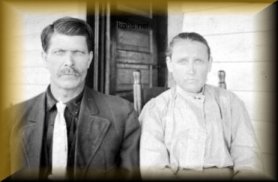
![]() Lawndale Baptist Church
Lawndale Baptist Church
by Dr. Stan Norman, Shelby Daily Star
In 1891, Major H. F. Schenck, the legendary owner and founder of Cleveland Mills in Lawndale, built a small church where mill workers could go to worship.
Initially called the Mill Chapel, it was first used by the Methodists when there were two Methodist denominations -Methodist Episcopal and Methodist Protestant - long before the two faiths united in 1942.
In July 1899, 40 people from New Bethel Baptist Church gathered at the chapel near the Broad River in Lawndale to organize a new Baptist congregation.
That was the day Lawndale Baptist Church was born.
From then on, the little chapel was a place where Baptists and Methodists worshipped side by side. Later the name was changed to Union Church because it brought together different faiths.
Records show that Major and Mrs. Schenck moved their membership at that time from New Bethel to Union.
"I've been a member since I was 15, and I'm 80 now," said Catherine Denton of Lawndale. "It was called the Union Church when I joined because the Baptists and the Methodists were meeting in the same church."
Services then were held on Sunday night instead of Sunday morning, Mrs. Denton said, and the Baptist and Methodist preachers preached on alternate Sundays.
"The Baptists and the Methodists had Sunday school together, but they had separate worship services every other Sunday night. We went to church every Sunday night, though, no matter which one was preaching," she said.
In a 1972 interview with The Star, former church historian Minnie Anna Forney discussed the concept of two faiths worshiping together.
"I guess we were never really aware of differences in denominations until we got our own churches and split up," Ms. Forney said. "I suspect I'm more tolerant of religious differences now because of my experiences in the Union Church."
Ms. Forney said there were never any differences caused by their denominational faiths.
"The attitude was one where you just go to church and worship and not concern yourself with differences in faith."
In 1945, the Baptists began discussions about building a new church, and after 12 years of planning and raising money, a new Baptist church - Lawndale Baptist - was completed in 1953.
The Methodists moved out of Union Church in November of 1952.
The first service in the new Lawndale Baptist Church was the baccalaureate service for the graduating class of Piedmont High School in May of 1953.
Mrs. Denton said the most significant event during her time at the church was the planning and worship services the people had together in building the church.
Her late husband, Fred Denton, a bookkeeper at Cleveland Mills for 54 years, kept the building fund records.
"The church was our life because all the children and the whole family were involved in it," she said.
No story about Lawndale Baptist Church would be complete without the mention of another local legend, the Rev. J.W. Suttle, who pastored the church for 36 years.
Affectionately known as "the little minister" due to his small stature, Rev. Suttle was active in many phases of Baptist work and served as moderator of the Kings Mountain Baptist Association for almost 40 years.
The current pastor, Paul Williams, has been at Lawndale Baptist for more than 10 years. A native of Lincolnton, he came to Lawndale from a pastorate in Winston-Salem.
"This is a small, little tight-knit community," Williams said. "They are very mission-minded and worked a lot with the East Coast flood victims."
Williams said there is a group in the church that repairs small items - that don't require license and fees - for people who have no other way to get things repaired.
"It's a small mill community," he said, "and our church has been affected by the closing of the mill, as the community has."
Williams said the strongest point in the church would be the women's organization, the Women's Missionary Union.
"They cook for people who have had a death or tragedy in their life," he said.
The church has a regular gospel singing, usually every third Thursday of the month.
"We bring in some of the best Southern gospel-singing groups in the country," Williams said.
